Taxation Law: Understanding Taxation Rulings and ITAA 1997
VerifiedAdded on 2023/06/12
|16
|4044
|71
AI Summary
This article discusses various aspects of taxation law such as prepaid rent, insurance payouts, allowable deductions, residency status, and capital gains tax implications. It also explains the relevant sections of ITAA 1997 and taxation rulings.
Contribute Materials
Your contribution can guide someone’s learning journey. Share your
documents today.
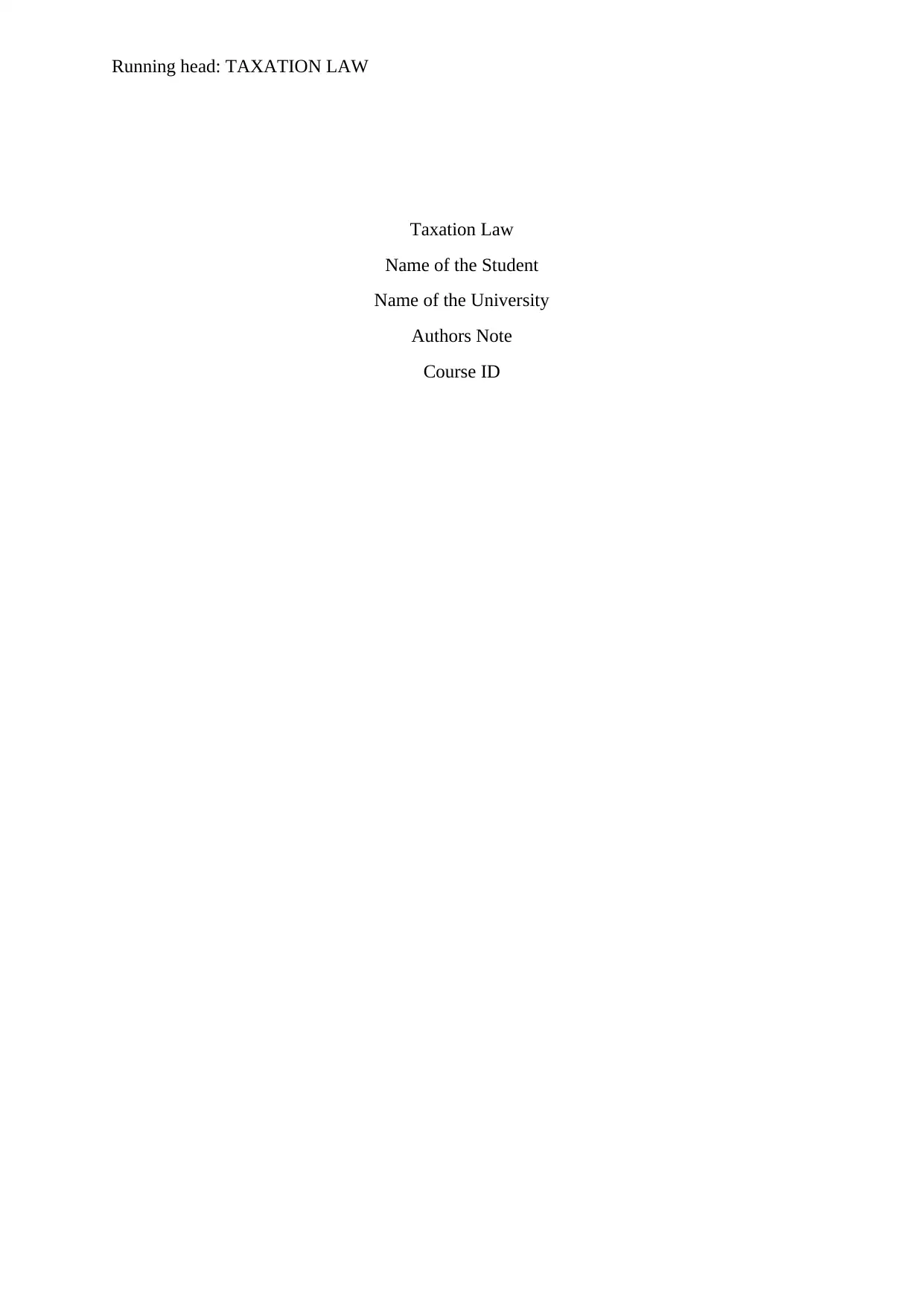
Running head: TAXATION LAW
Taxation Law
Name of the Student
Name of the University
Authors Note
Course ID
Taxation Law
Name of the Student
Name of the University
Authors Note
Course ID
Secure Best Marks with AI Grader
Need help grading? Try our AI Grader for instant feedback on your assignments.
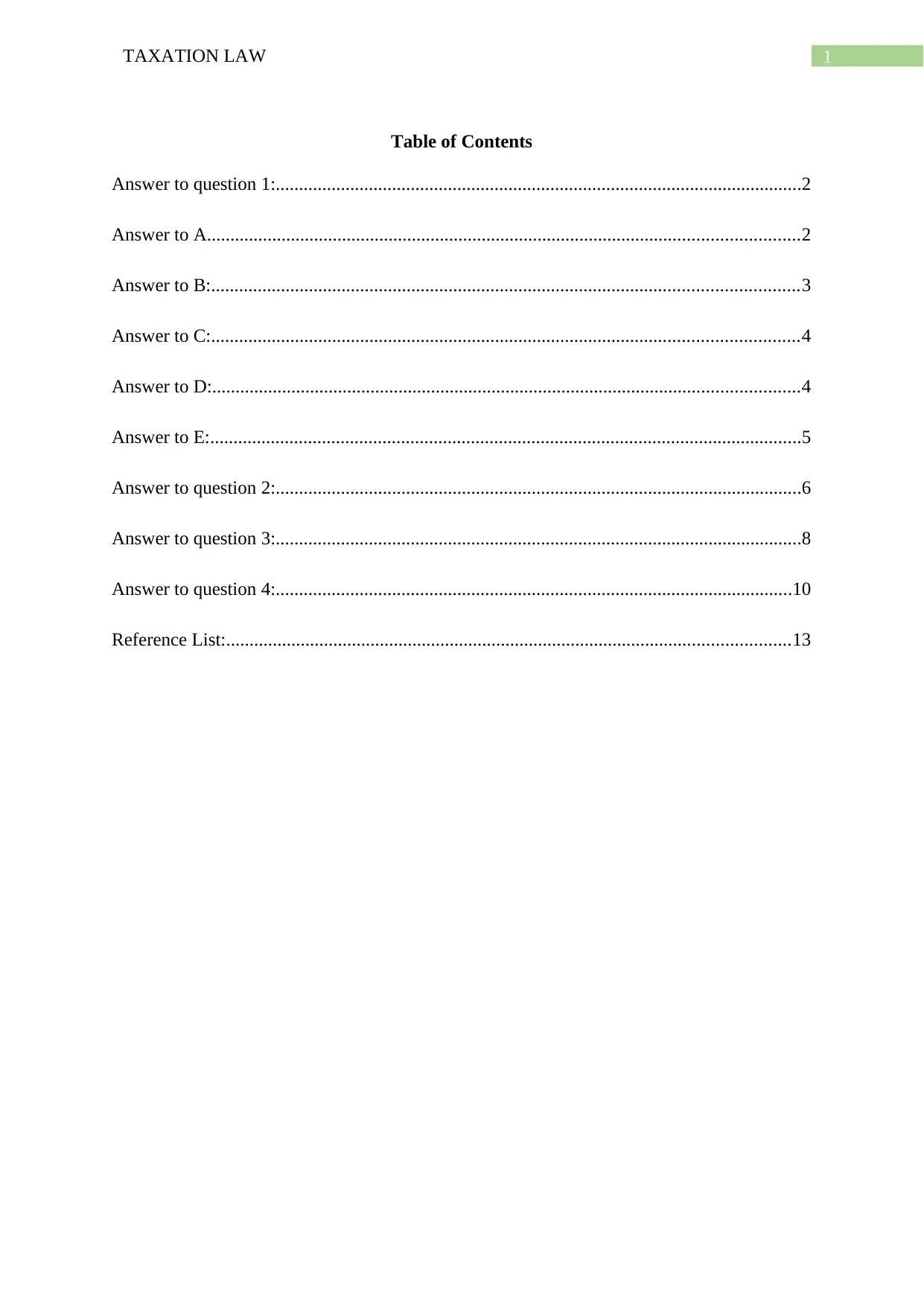
1TAXATION LAW
Table of Contents
Answer to question 1:.................................................................................................................2
Answer to A...............................................................................................................................2
Answer to B:..............................................................................................................................3
Answer to C:..............................................................................................................................4
Answer to D:..............................................................................................................................4
Answer to E:...............................................................................................................................5
Answer to question 2:.................................................................................................................6
Answer to question 3:.................................................................................................................8
Answer to question 4:...............................................................................................................10
Reference List:.........................................................................................................................13
Table of Contents
Answer to question 1:.................................................................................................................2
Answer to A...............................................................................................................................2
Answer to B:..............................................................................................................................3
Answer to C:..............................................................................................................................4
Answer to D:..............................................................................................................................4
Answer to E:...............................................................................................................................5
Answer to question 2:.................................................................................................................6
Answer to question 3:.................................................................................................................8
Answer to question 4:...............................................................................................................10
Reference List:.........................................................................................................................13
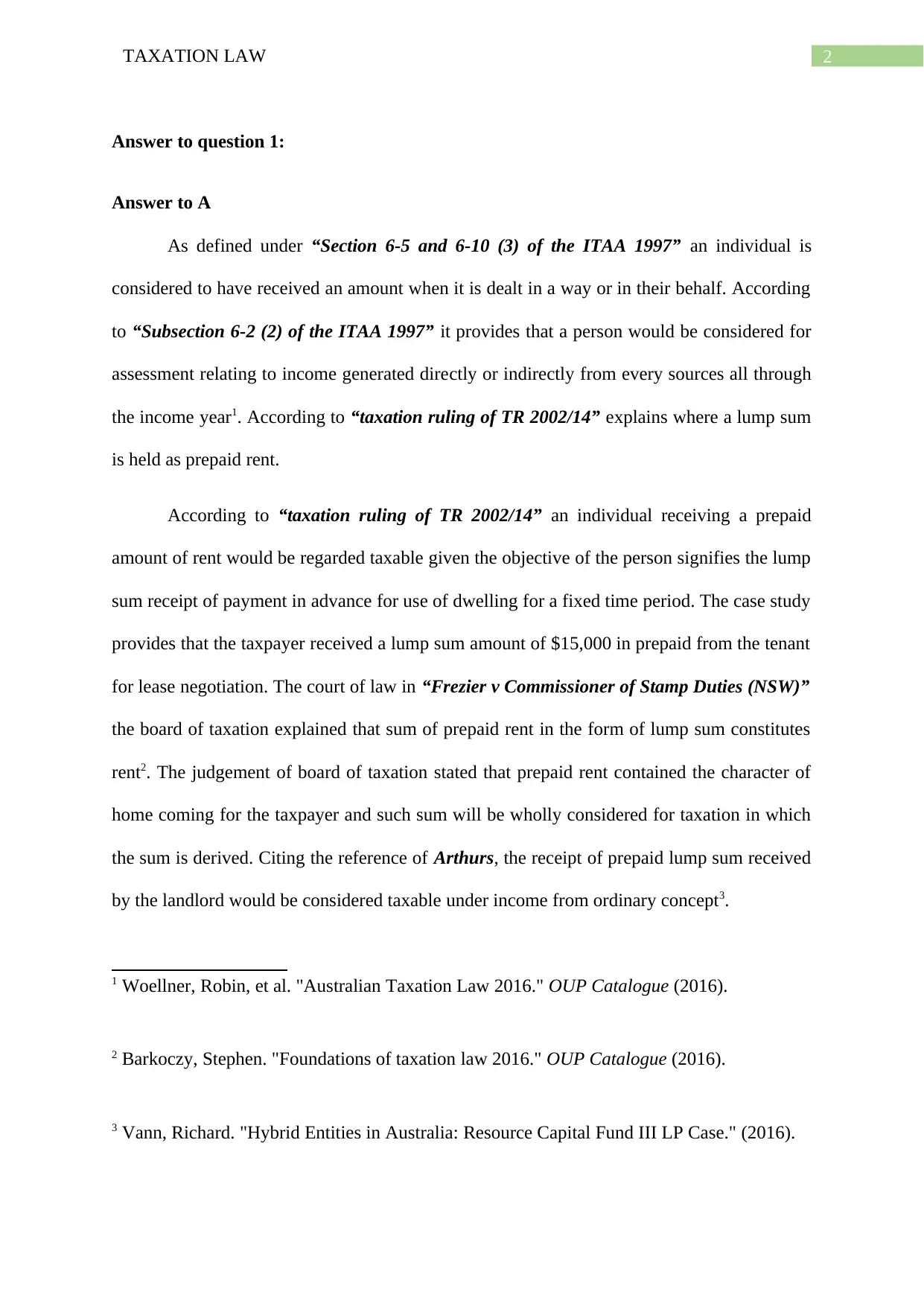
2TAXATION LAW
Answer to question 1:
Answer to A
As defined under “Section 6-5 and 6-10 (3) of the ITAA 1997” an individual is
considered to have received an amount when it is dealt in a way or in their behalf. According
to “Subsection 6-2 (2) of the ITAA 1997” it provides that a person would be considered for
assessment relating to income generated directly or indirectly from every sources all through
the income year1. According to “taxation ruling of TR 2002/14” explains where a lump sum
is held as prepaid rent.
According to “taxation ruling of TR 2002/14” an individual receiving a prepaid
amount of rent would be regarded taxable given the objective of the person signifies the lump
sum receipt of payment in advance for use of dwelling for a fixed time period. The case study
provides that the taxpayer received a lump sum amount of $15,000 in prepaid from the tenant
for lease negotiation. The court of law in “Frezier v Commissioner of Stamp Duties (NSW)”
the board of taxation explained that sum of prepaid rent in the form of lump sum constitutes
rent2. The judgement of board of taxation stated that prepaid rent contained the character of
home coming for the taxpayer and such sum will be wholly considered for taxation in which
the sum is derived. Citing the reference of Arthurs, the receipt of prepaid lump sum received
by the landlord would be considered taxable under income from ordinary concept3.
1 Woellner, Robin, et al. "Australian Taxation Law 2016." OUP Catalogue (2016).
2 Barkoczy, Stephen. "Foundations of taxation law 2016." OUP Catalogue (2016).
3 Vann, Richard. "Hybrid Entities in Australia: Resource Capital Fund III LP Case." (2016).
Answer to question 1:
Answer to A
As defined under “Section 6-5 and 6-10 (3) of the ITAA 1997” an individual is
considered to have received an amount when it is dealt in a way or in their behalf. According
to “Subsection 6-2 (2) of the ITAA 1997” it provides that a person would be considered for
assessment relating to income generated directly or indirectly from every sources all through
the income year1. According to “taxation ruling of TR 2002/14” explains where a lump sum
is held as prepaid rent.
According to “taxation ruling of TR 2002/14” an individual receiving a prepaid
amount of rent would be regarded taxable given the objective of the person signifies the lump
sum receipt of payment in advance for use of dwelling for a fixed time period. The case study
provides that the taxpayer received a lump sum amount of $15,000 in prepaid from the tenant
for lease negotiation. The court of law in “Frezier v Commissioner of Stamp Duties (NSW)”
the board of taxation explained that sum of prepaid rent in the form of lump sum constitutes
rent2. The judgement of board of taxation stated that prepaid rent contained the character of
home coming for the taxpayer and such sum will be wholly considered for taxation in which
the sum is derived. Citing the reference of Arthurs, the receipt of prepaid lump sum received
by the landlord would be considered taxable under income from ordinary concept3.
1 Woellner, Robin, et al. "Australian Taxation Law 2016." OUP Catalogue (2016).
2 Barkoczy, Stephen. "Foundations of taxation law 2016." OUP Catalogue (2016).
3 Vann, Richard. "Hybrid Entities in Australia: Resource Capital Fund III LP Case." (2016).
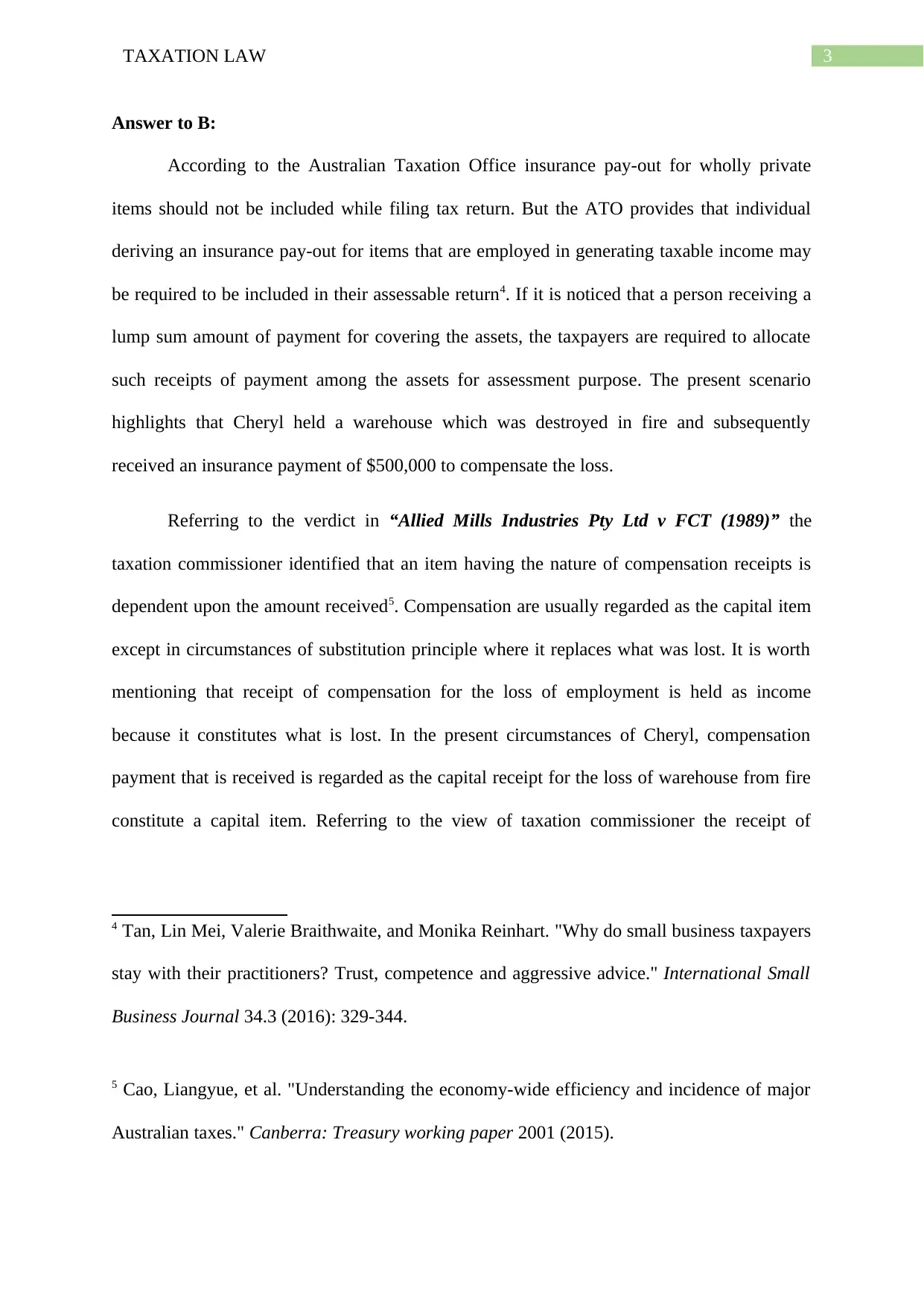
3TAXATION LAW
Answer to B:
According to the Australian Taxation Office insurance pay-out for wholly private
items should not be included while filing tax return. But the ATO provides that individual
deriving an insurance pay-out for items that are employed in generating taxable income may
be required to be included in their assessable return4. If it is noticed that a person receiving a
lump sum amount of payment for covering the assets, the taxpayers are required to allocate
such receipts of payment among the assets for assessment purpose. The present scenario
highlights that Cheryl held a warehouse which was destroyed in fire and subsequently
received an insurance payment of $500,000 to compensate the loss.
Referring to the verdict in “Allied Mills Industries Pty Ltd v FCT (1989)” the
taxation commissioner identified that an item having the nature of compensation receipts is
dependent upon the amount received5. Compensation are usually regarded as the capital item
except in circumstances of substitution principle where it replaces what was lost. It is worth
mentioning that receipt of compensation for the loss of employment is held as income
because it constitutes what is lost. In the present circumstances of Cheryl, compensation
payment that is received is regarded as the capital receipt for the loss of warehouse from fire
constitute a capital item. Referring to the view of taxation commissioner the receipt of
4 Tan, Lin Mei, Valerie Braithwaite, and Monika Reinhart. "Why do small business taxpayers
stay with their practitioners? Trust, competence and aggressive advice." International Small
Business Journal 34.3 (2016): 329-344.
5 Cao, Liangyue, et al. "Understanding the economy-wide efficiency and incidence of major
Australian taxes." Canberra: Treasury working paper 2001 (2015).
Answer to B:
According to the Australian Taxation Office insurance pay-out for wholly private
items should not be included while filing tax return. But the ATO provides that individual
deriving an insurance pay-out for items that are employed in generating taxable income may
be required to be included in their assessable return4. If it is noticed that a person receiving a
lump sum amount of payment for covering the assets, the taxpayers are required to allocate
such receipts of payment among the assets for assessment purpose. The present scenario
highlights that Cheryl held a warehouse which was destroyed in fire and subsequently
received an insurance payment of $500,000 to compensate the loss.
Referring to the verdict in “Allied Mills Industries Pty Ltd v FCT (1989)” the
taxation commissioner identified that an item having the nature of compensation receipts is
dependent upon the amount received5. Compensation are usually regarded as the capital item
except in circumstances of substitution principle where it replaces what was lost. It is worth
mentioning that receipt of compensation for the loss of employment is held as income
because it constitutes what is lost. In the present circumstances of Cheryl, compensation
payment that is received is regarded as the capital receipt for the loss of warehouse from fire
constitute a capital item. Referring to the view of taxation commissioner the receipt of
4 Tan, Lin Mei, Valerie Braithwaite, and Monika Reinhart. "Why do small business taxpayers
stay with their practitioners? Trust, competence and aggressive advice." International Small
Business Journal 34.3 (2016): 329-344.
5 Cao, Liangyue, et al. "Understanding the economy-wide efficiency and incidence of major
Australian taxes." Canberra: Treasury working paper 2001 (2015).
Secure Best Marks with AI Grader
Need help grading? Try our AI Grader for instant feedback on your assignments.
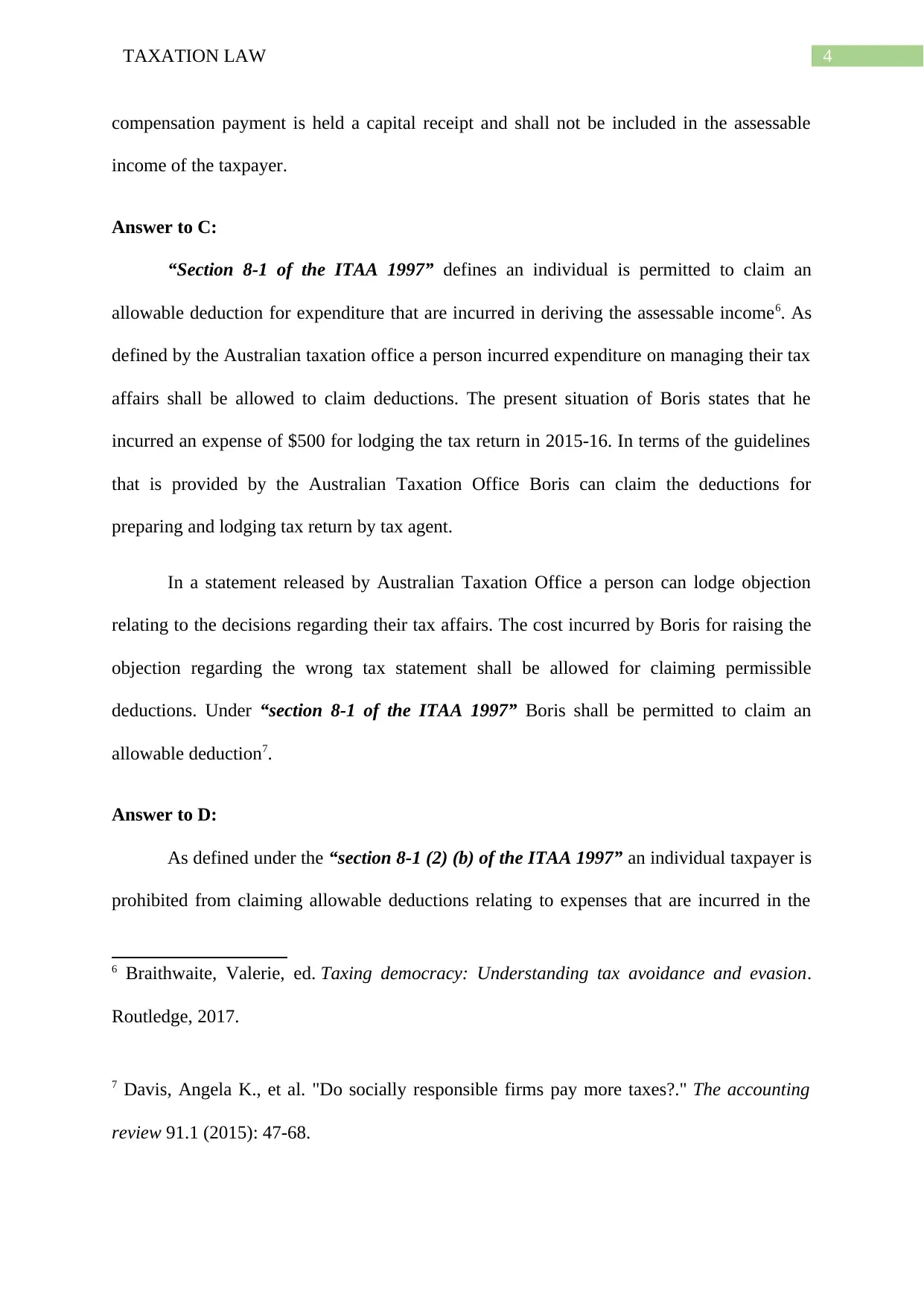
4TAXATION LAW
compensation payment is held a capital receipt and shall not be included in the assessable
income of the taxpayer.
Answer to C:
“Section 8-1 of the ITAA 1997” defines an individual is permitted to claim an
allowable deduction for expenditure that are incurred in deriving the assessable income6. As
defined by the Australian taxation office a person incurred expenditure on managing their tax
affairs shall be allowed to claim deductions. The present situation of Boris states that he
incurred an expense of $500 for lodging the tax return in 2015-16. In terms of the guidelines
that is provided by the Australian Taxation Office Boris can claim the deductions for
preparing and lodging tax return by tax agent.
In a statement released by Australian Taxation Office a person can lodge objection
relating to the decisions regarding their tax affairs. The cost incurred by Boris for raising the
objection regarding the wrong tax statement shall be allowed for claiming permissible
deductions. Under “section 8-1 of the ITAA 1997” Boris shall be permitted to claim an
allowable deduction7.
Answer to D:
As defined under the “section 8-1 (2) (b) of the ITAA 1997” an individual taxpayer is
prohibited from claiming allowable deductions relating to expenses that are incurred in the
6 Braithwaite, Valerie, ed. Taxing democracy: Understanding tax avoidance and evasion.
Routledge, 2017.
7 Davis, Angela K., et al. "Do socially responsible firms pay more taxes?." The accounting
review 91.1 (2015): 47-68.
compensation payment is held a capital receipt and shall not be included in the assessable
income of the taxpayer.
Answer to C:
“Section 8-1 of the ITAA 1997” defines an individual is permitted to claim an
allowable deduction for expenditure that are incurred in deriving the assessable income6. As
defined by the Australian taxation office a person incurred expenditure on managing their tax
affairs shall be allowed to claim deductions. The present situation of Boris states that he
incurred an expense of $500 for lodging the tax return in 2015-16. In terms of the guidelines
that is provided by the Australian Taxation Office Boris can claim the deductions for
preparing and lodging tax return by tax agent.
In a statement released by Australian Taxation Office a person can lodge objection
relating to the decisions regarding their tax affairs. The cost incurred by Boris for raising the
objection regarding the wrong tax statement shall be allowed for claiming permissible
deductions. Under “section 8-1 of the ITAA 1997” Boris shall be permitted to claim an
allowable deduction7.
Answer to D:
As defined under the “section 8-1 (2) (b) of the ITAA 1997” an individual taxpayer is
prohibited from claiming allowable deductions relating to expenses that are incurred in the
6 Braithwaite, Valerie, ed. Taxing democracy: Understanding tax avoidance and evasion.
Routledge, 2017.
7 Davis, Angela K., et al. "Do socially responsible firms pay more taxes?." The accounting
review 91.1 (2015): 47-68.
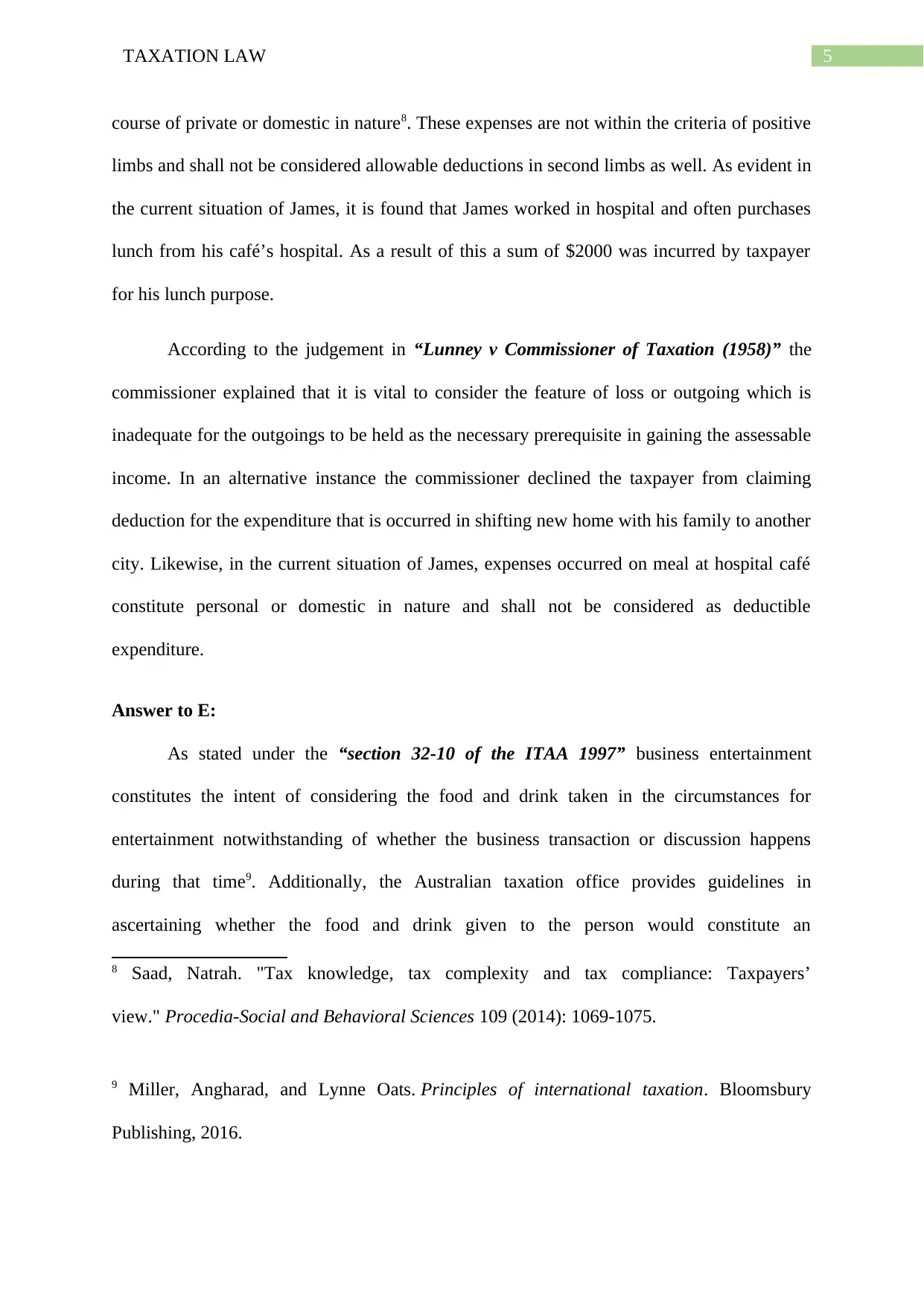
5TAXATION LAW
course of private or domestic in nature8. These expenses are not within the criteria of positive
limbs and shall not be considered allowable deductions in second limbs as well. As evident in
the current situation of James, it is found that James worked in hospital and often purchases
lunch from his café’s hospital. As a result of this a sum of $2000 was incurred by taxpayer
for his lunch purpose.
According to the judgement in “Lunney v Commissioner of Taxation (1958)” the
commissioner explained that it is vital to consider the feature of loss or outgoing which is
inadequate for the outgoings to be held as the necessary prerequisite in gaining the assessable
income. In an alternative instance the commissioner declined the taxpayer from claiming
deduction for the expenditure that is occurred in shifting new home with his family to another
city. Likewise, in the current situation of James, expenses occurred on meal at hospital café
constitute personal or domestic in nature and shall not be considered as deductible
expenditure.
Answer to E:
As stated under the “section 32-10 of the ITAA 1997” business entertainment
constitutes the intent of considering the food and drink taken in the circumstances for
entertainment notwithstanding of whether the business transaction or discussion happens
during that time9. Additionally, the Australian taxation office provides guidelines in
ascertaining whether the food and drink given to the person would constitute an
8 Saad, Natrah. "Tax knowledge, tax complexity and tax compliance: Taxpayers’
view." Procedia-Social and Behavioral Sciences 109 (2014): 1069-1075.
9 Miller, Angharad, and Lynne Oats. Principles of international taxation. Bloomsbury
Publishing, 2016.
course of private or domestic in nature8. These expenses are not within the criteria of positive
limbs and shall not be considered allowable deductions in second limbs as well. As evident in
the current situation of James, it is found that James worked in hospital and often purchases
lunch from his café’s hospital. As a result of this a sum of $2000 was incurred by taxpayer
for his lunch purpose.
According to the judgement in “Lunney v Commissioner of Taxation (1958)” the
commissioner explained that it is vital to consider the feature of loss or outgoing which is
inadequate for the outgoings to be held as the necessary prerequisite in gaining the assessable
income. In an alternative instance the commissioner declined the taxpayer from claiming
deduction for the expenditure that is occurred in shifting new home with his family to another
city. Likewise, in the current situation of James, expenses occurred on meal at hospital café
constitute personal or domestic in nature and shall not be considered as deductible
expenditure.
Answer to E:
As stated under the “section 32-10 of the ITAA 1997” business entertainment
constitutes the intent of considering the food and drink taken in the circumstances for
entertainment notwithstanding of whether the business transaction or discussion happens
during that time9. Additionally, the Australian taxation office provides guidelines in
ascertaining whether the food and drink given to the person would constitute an
8 Saad, Natrah. "Tax knowledge, tax complexity and tax compliance: Taxpayers’
view." Procedia-Social and Behavioral Sciences 109 (2014): 1069-1075.
9 Miller, Angharad, and Lynne Oats. Principles of international taxation. Bloomsbury
Publishing, 2016.
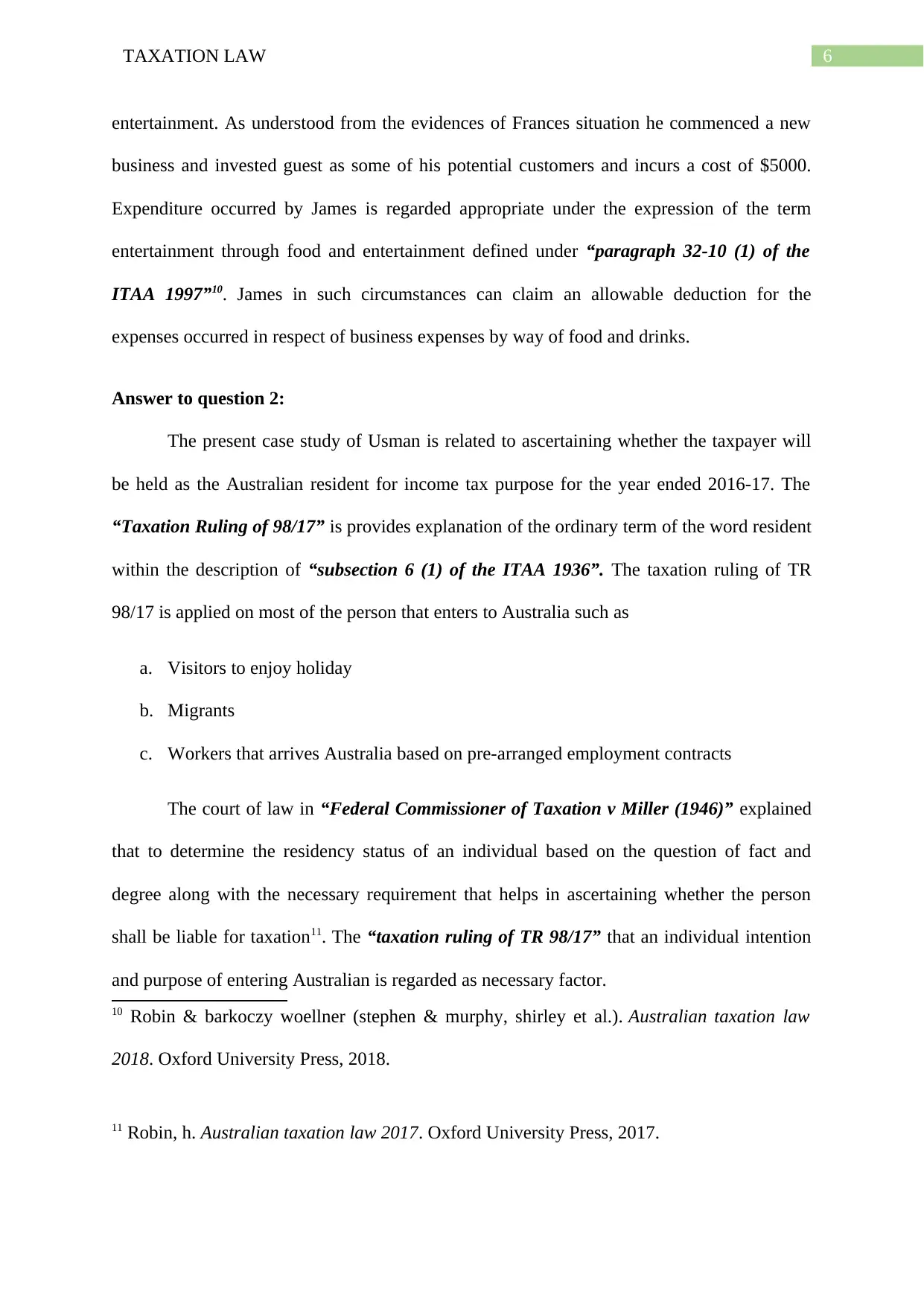
6TAXATION LAW
entertainment. As understood from the evidences of Frances situation he commenced a new
business and invested guest as some of his potential customers and incurs a cost of $5000.
Expenditure occurred by James is regarded appropriate under the expression of the term
entertainment through food and entertainment defined under “paragraph 32-10 (1) of the
ITAA 1997”10. James in such circumstances can claim an allowable deduction for the
expenses occurred in respect of business expenses by way of food and drinks.
Answer to question 2:
The present case study of Usman is related to ascertaining whether the taxpayer will
be held as the Australian resident for income tax purpose for the year ended 2016-17. The
“Taxation Ruling of 98/17” is provides explanation of the ordinary term of the word resident
within the description of “subsection 6 (1) of the ITAA 1936”. The taxation ruling of TR
98/17 is applied on most of the person that enters to Australia such as
a. Visitors to enjoy holiday
b. Migrants
c. Workers that arrives Australia based on pre-arranged employment contracts
The court of law in “Federal Commissioner of Taxation v Miller (1946)” explained
that to determine the residency status of an individual based on the question of fact and
degree along with the necessary requirement that helps in ascertaining whether the person
shall be liable for taxation11. The “taxation ruling of TR 98/17” that an individual intention
and purpose of entering Australian is regarded as necessary factor.
10 Robin & barkoczy woellner (stephen & murphy, shirley et al.). Australian taxation law
2018. Oxford University Press, 2018.
11 Robin, h. Australian taxation law 2017. Oxford University Press, 2017.
entertainment. As understood from the evidences of Frances situation he commenced a new
business and invested guest as some of his potential customers and incurs a cost of $5000.
Expenditure occurred by James is regarded appropriate under the expression of the term
entertainment through food and entertainment defined under “paragraph 32-10 (1) of the
ITAA 1997”10. James in such circumstances can claim an allowable deduction for the
expenses occurred in respect of business expenses by way of food and drinks.
Answer to question 2:
The present case study of Usman is related to ascertaining whether the taxpayer will
be held as the Australian resident for income tax purpose for the year ended 2016-17. The
“Taxation Ruling of 98/17” is provides explanation of the ordinary term of the word resident
within the description of “subsection 6 (1) of the ITAA 1936”. The taxation ruling of TR
98/17 is applied on most of the person that enters to Australia such as
a. Visitors to enjoy holiday
b. Migrants
c. Workers that arrives Australia based on pre-arranged employment contracts
The court of law in “Federal Commissioner of Taxation v Miller (1946)” explained
that to determine the residency status of an individual based on the question of fact and
degree along with the necessary requirement that helps in ascertaining whether the person
shall be liable for taxation11. The “taxation ruling of TR 98/17” that an individual intention
and purpose of entering Australian is regarded as necessary factor.
10 Robin & barkoczy woellner (stephen & murphy, shirley et al.). Australian taxation law
2018. Oxford University Press, 2018.
11 Robin, h. Australian taxation law 2017. Oxford University Press, 2017.
Paraphrase This Document
Need a fresh take? Get an instant paraphrase of this document with our AI Paraphraser
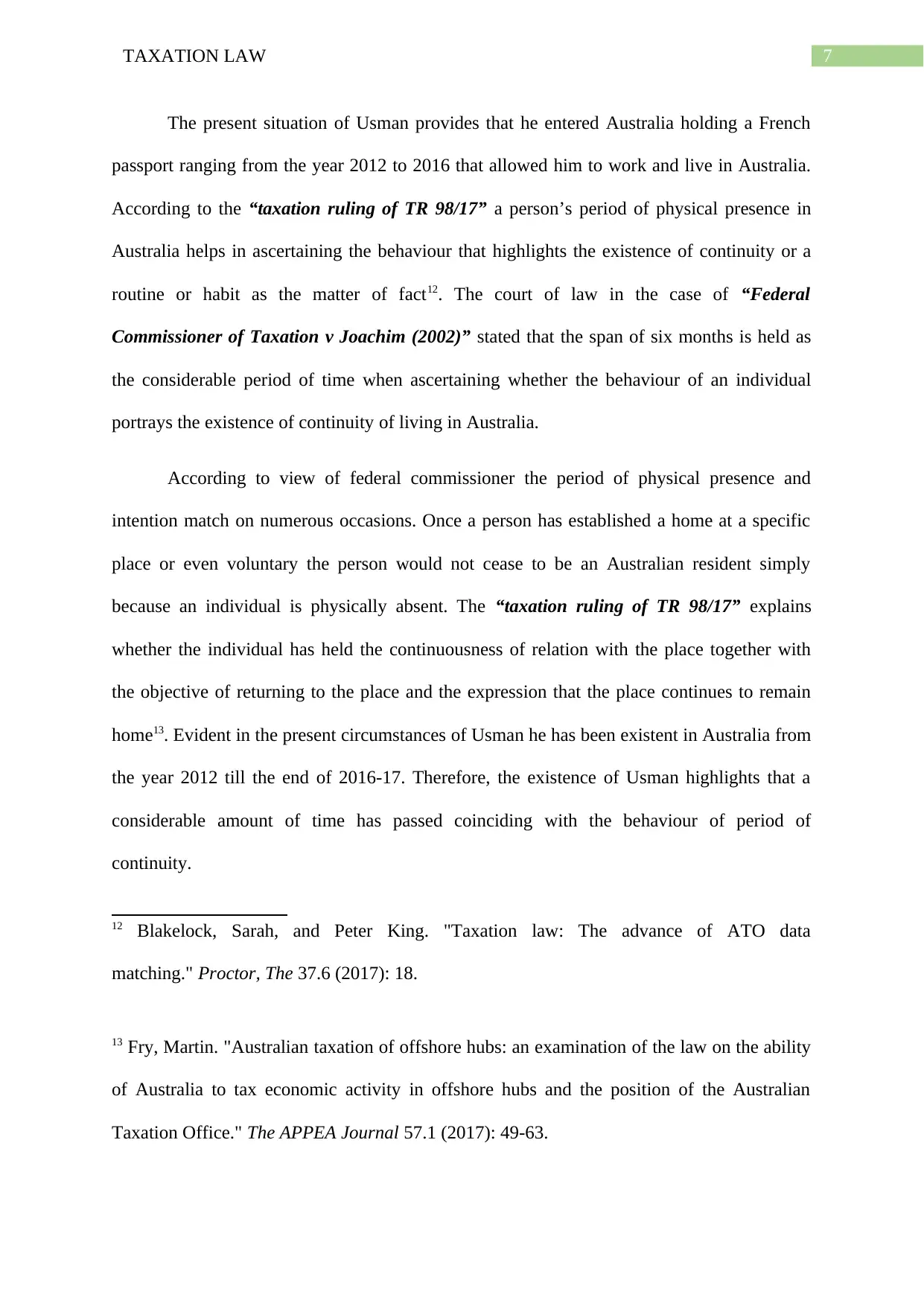
7TAXATION LAW
The present situation of Usman provides that he entered Australia holding a French
passport ranging from the year 2012 to 2016 that allowed him to work and live in Australia.
According to the “taxation ruling of TR 98/17” a person’s period of physical presence in
Australia helps in ascertaining the behaviour that highlights the existence of continuity or a
routine or habit as the matter of fact12. The court of law in the case of “Federal
Commissioner of Taxation v Joachim (2002)” stated that the span of six months is held as
the considerable period of time when ascertaining whether the behaviour of an individual
portrays the existence of continuity of living in Australia.
According to view of federal commissioner the period of physical presence and
intention match on numerous occasions. Once a person has established a home at a specific
place or even voluntary the person would not cease to be an Australian resident simply
because an individual is physically absent. The “taxation ruling of TR 98/17” explains
whether the individual has held the continuousness of relation with the place together with
the objective of returning to the place and the expression that the place continues to remain
home13. Evident in the present circumstances of Usman he has been existent in Australia from
the year 2012 till the end of 2016-17. Therefore, the existence of Usman highlights that a
considerable amount of time has passed coinciding with the behaviour of period of
continuity.
12 Blakelock, Sarah, and Peter King. "Taxation law: The advance of ATO data
matching." Proctor, The 37.6 (2017): 18.
13 Fry, Martin. "Australian taxation of offshore hubs: an examination of the law on the ability
of Australia to tax economic activity in offshore hubs and the position of the Australian
Taxation Office." The APPEA Journal 57.1 (2017): 49-63.
The present situation of Usman provides that he entered Australia holding a French
passport ranging from the year 2012 to 2016 that allowed him to work and live in Australia.
According to the “taxation ruling of TR 98/17” a person’s period of physical presence in
Australia helps in ascertaining the behaviour that highlights the existence of continuity or a
routine or habit as the matter of fact12. The court of law in the case of “Federal
Commissioner of Taxation v Joachim (2002)” stated that the span of six months is held as
the considerable period of time when ascertaining whether the behaviour of an individual
portrays the existence of continuity of living in Australia.
According to view of federal commissioner the period of physical presence and
intention match on numerous occasions. Once a person has established a home at a specific
place or even voluntary the person would not cease to be an Australian resident simply
because an individual is physically absent. The “taxation ruling of TR 98/17” explains
whether the individual has held the continuousness of relation with the place together with
the objective of returning to the place and the expression that the place continues to remain
home13. Evident in the present circumstances of Usman he has been existent in Australia from
the year 2012 till the end of 2016-17. Therefore, the existence of Usman highlights that a
considerable amount of time has passed coinciding with the behaviour of period of
continuity.
12 Blakelock, Sarah, and Peter King. "Taxation law: The advance of ATO data
matching." Proctor, The 37.6 (2017): 18.
13 Fry, Martin. "Australian taxation of offshore hubs: an examination of the law on the ability
of Australia to tax economic activity in offshore hubs and the position of the Australian
Taxation Office." The APPEA Journal 57.1 (2017): 49-63.
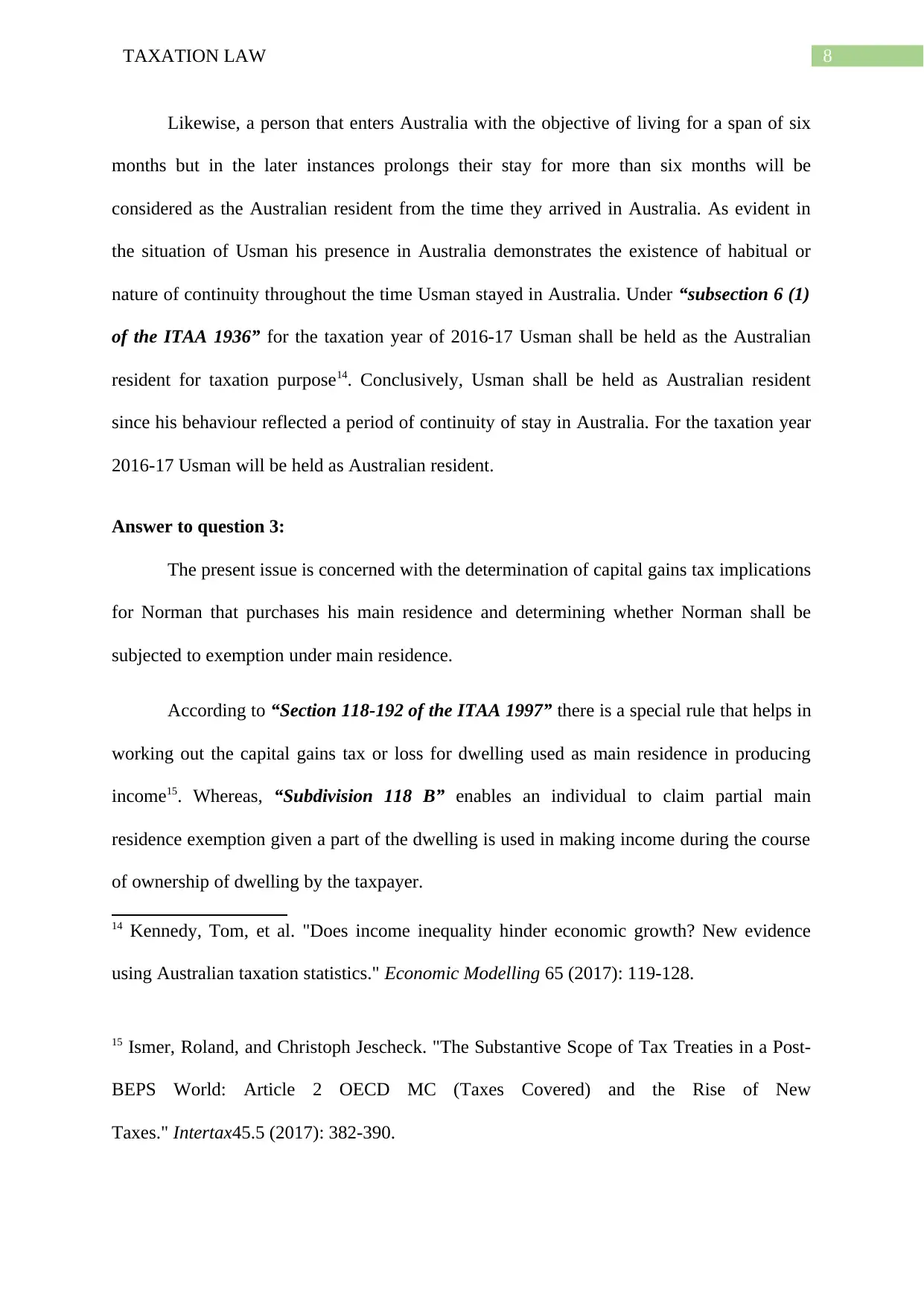
8TAXATION LAW
Likewise, a person that enters Australia with the objective of living for a span of six
months but in the later instances prolongs their stay for more than six months will be
considered as the Australian resident from the time they arrived in Australia. As evident in
the situation of Usman his presence in Australia demonstrates the existence of habitual or
nature of continuity throughout the time Usman stayed in Australia. Under “subsection 6 (1)
of the ITAA 1936” for the taxation year of 2016-17 Usman shall be held as the Australian
resident for taxation purpose14. Conclusively, Usman shall be held as Australian resident
since his behaviour reflected a period of continuity of stay in Australia. For the taxation year
2016-17 Usman will be held as Australian resident.
Answer to question 3:
The present issue is concerned with the determination of capital gains tax implications
for Norman that purchases his main residence and determining whether Norman shall be
subjected to exemption under main residence.
According to “Section 118-192 of the ITAA 1997” there is a special rule that helps in
working out the capital gains tax or loss for dwelling used as main residence in producing
income15. Whereas, “Subdivision 118 B” enables an individual to claim partial main
residence exemption given a part of the dwelling is used in making income during the course
of ownership of dwelling by the taxpayer.
14 Kennedy, Tom, et al. "Does income inequality hinder economic growth? New evidence
using Australian taxation statistics." Economic Modelling 65 (2017): 119-128.
15 Ismer, Roland, and Christoph Jescheck. "The Substantive Scope of Tax Treaties in a Post-
BEPS World: Article 2 OECD MC (Taxes Covered) and the Rise of New
Taxes." Intertax45.5 (2017): 382-390.
Likewise, a person that enters Australia with the objective of living for a span of six
months but in the later instances prolongs their stay for more than six months will be
considered as the Australian resident from the time they arrived in Australia. As evident in
the situation of Usman his presence in Australia demonstrates the existence of habitual or
nature of continuity throughout the time Usman stayed in Australia. Under “subsection 6 (1)
of the ITAA 1936” for the taxation year of 2016-17 Usman shall be held as the Australian
resident for taxation purpose14. Conclusively, Usman shall be held as Australian resident
since his behaviour reflected a period of continuity of stay in Australia. For the taxation year
2016-17 Usman will be held as Australian resident.
Answer to question 3:
The present issue is concerned with the determination of capital gains tax implications
for Norman that purchases his main residence and determining whether Norman shall be
subjected to exemption under main residence.
According to “Section 118-192 of the ITAA 1997” there is a special rule that helps in
working out the capital gains tax or loss for dwelling used as main residence in producing
income15. Whereas, “Subdivision 118 B” enables an individual to claim partial main
residence exemption given a part of the dwelling is used in making income during the course
of ownership of dwelling by the taxpayer.
14 Kennedy, Tom, et al. "Does income inequality hinder economic growth? New evidence
using Australian taxation statistics." Economic Modelling 65 (2017): 119-128.
15 Ismer, Roland, and Christoph Jescheck. "The Substantive Scope of Tax Treaties in a Post-
BEPS World: Article 2 OECD MC (Taxes Covered) and the Rise of New
Taxes." Intertax45.5 (2017): 382-390.
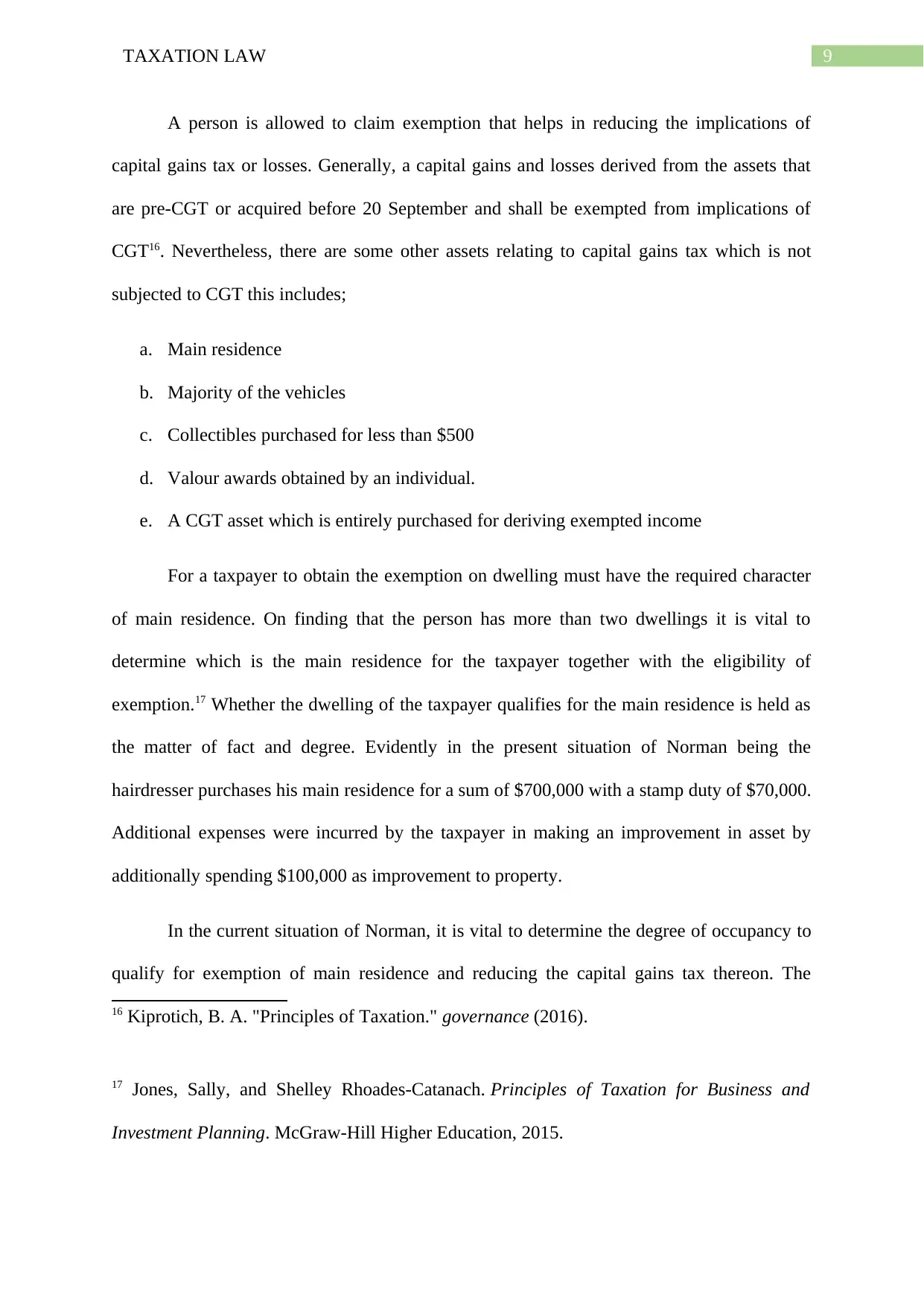
9TAXATION LAW
A person is allowed to claim exemption that helps in reducing the implications of
capital gains tax or losses. Generally, a capital gains and losses derived from the assets that
are pre-CGT or acquired before 20 September and shall be exempted from implications of
CGT16. Nevertheless, there are some other assets relating to capital gains tax which is not
subjected to CGT this includes;
a. Main residence
b. Majority of the vehicles
c. Collectibles purchased for less than $500
d. Valour awards obtained by an individual.
e. A CGT asset which is entirely purchased for deriving exempted income
For a taxpayer to obtain the exemption on dwelling must have the required character
of main residence. On finding that the person has more than two dwellings it is vital to
determine which is the main residence for the taxpayer together with the eligibility of
exemption.17 Whether the dwelling of the taxpayer qualifies for the main residence is held as
the matter of fact and degree. Evidently in the present situation of Norman being the
hairdresser purchases his main residence for a sum of $700,000 with a stamp duty of $70,000.
Additional expenses were incurred by the taxpayer in making an improvement in asset by
additionally spending $100,000 as improvement to property.
In the current situation of Norman, it is vital to determine the degree of occupancy to
qualify for exemption of main residence and reducing the capital gains tax thereon. The
16 Kiprotich, B. A. "Principles of Taxation." governance (2016).
17 Jones, Sally, and Shelley Rhoades-Catanach. Principles of Taxation for Business and
Investment Planning. McGraw-Hill Higher Education, 2015.
A person is allowed to claim exemption that helps in reducing the implications of
capital gains tax or losses. Generally, a capital gains and losses derived from the assets that
are pre-CGT or acquired before 20 September and shall be exempted from implications of
CGT16. Nevertheless, there are some other assets relating to capital gains tax which is not
subjected to CGT this includes;
a. Main residence
b. Majority of the vehicles
c. Collectibles purchased for less than $500
d. Valour awards obtained by an individual.
e. A CGT asset which is entirely purchased for deriving exempted income
For a taxpayer to obtain the exemption on dwelling must have the required character
of main residence. On finding that the person has more than two dwellings it is vital to
determine which is the main residence for the taxpayer together with the eligibility of
exemption.17 Whether the dwelling of the taxpayer qualifies for the main residence is held as
the matter of fact and degree. Evidently in the present situation of Norman being the
hairdresser purchases his main residence for a sum of $700,000 with a stamp duty of $70,000.
Additional expenses were incurred by the taxpayer in making an improvement in asset by
additionally spending $100,000 as improvement to property.
In the current situation of Norman, it is vital to determine the degree of occupancy to
qualify for exemption of main residence and reducing the capital gains tax thereon. The
16 Kiprotich, B. A. "Principles of Taxation." governance (2016).
17 Jones, Sally, and Shelley Rhoades-Catanach. Principles of Taxation for Business and
Investment Planning. McGraw-Hill Higher Education, 2015.
Secure Best Marks with AI Grader
Need help grading? Try our AI Grader for instant feedback on your assignments.
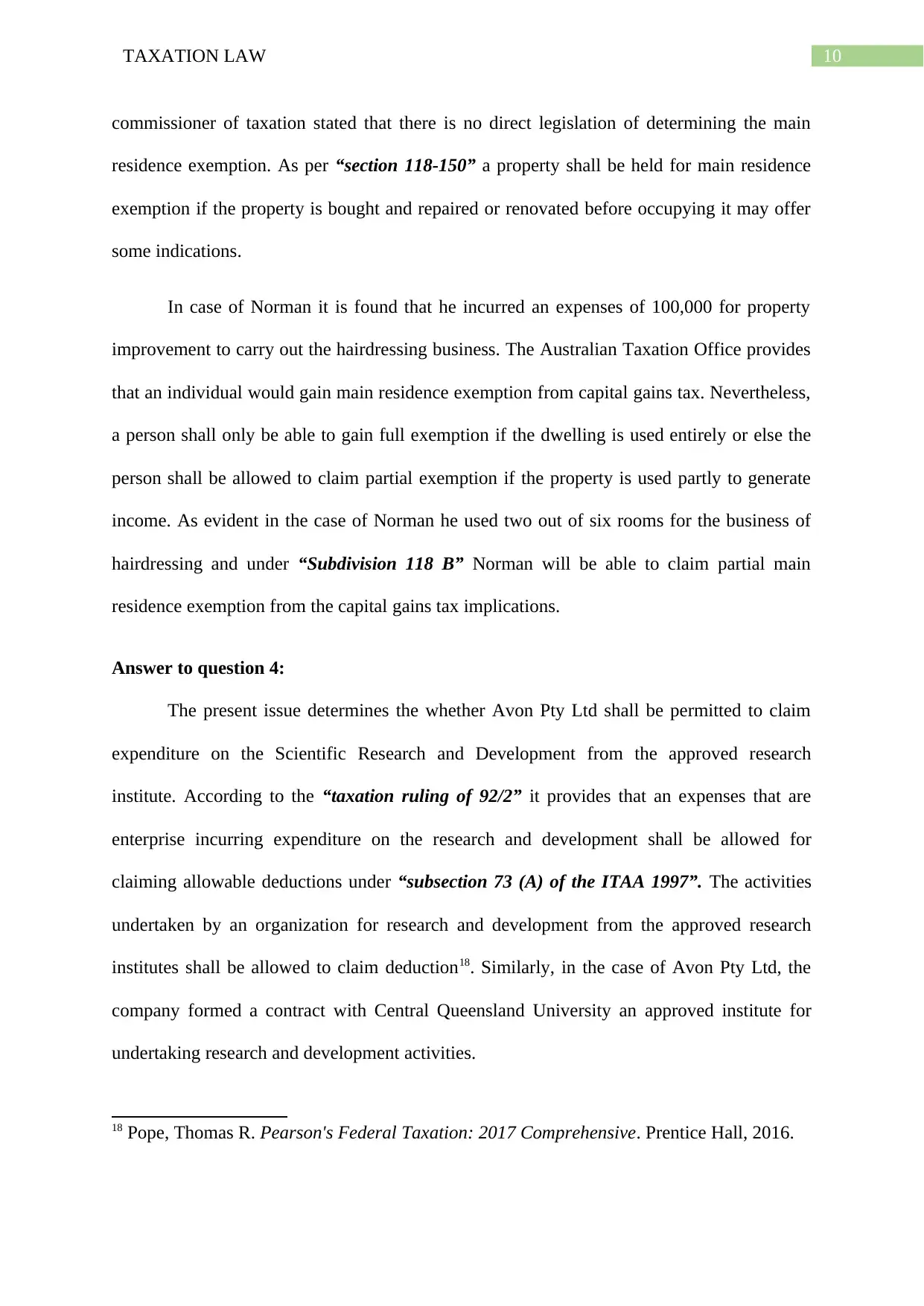
10TAXATION LAW
commissioner of taxation stated that there is no direct legislation of determining the main
residence exemption. As per “section 118-150” a property shall be held for main residence
exemption if the property is bought and repaired or renovated before occupying it may offer
some indications.
In case of Norman it is found that he incurred an expenses of 100,000 for property
improvement to carry out the hairdressing business. The Australian Taxation Office provides
that an individual would gain main residence exemption from capital gains tax. Nevertheless,
a person shall only be able to gain full exemption if the dwelling is used entirely or else the
person shall be allowed to claim partial exemption if the property is used partly to generate
income. As evident in the case of Norman he used two out of six rooms for the business of
hairdressing and under “Subdivision 118 B” Norman will be able to claim partial main
residence exemption from the capital gains tax implications.
Answer to question 4:
The present issue determines the whether Avon Pty Ltd shall be permitted to claim
expenditure on the Scientific Research and Development from the approved research
institute. According to the “taxation ruling of 92/2” it provides that an expenses that are
enterprise incurring expenditure on the research and development shall be allowed for
claiming allowable deductions under “subsection 73 (A) of the ITAA 1997”. The activities
undertaken by an organization for research and development from the approved research
institutes shall be allowed to claim deduction18. Similarly, in the case of Avon Pty Ltd, the
company formed a contract with Central Queensland University an approved institute for
undertaking research and development activities.
18 Pope, Thomas R. Pearson's Federal Taxation: 2017 Comprehensive. Prentice Hall, 2016.
commissioner of taxation stated that there is no direct legislation of determining the main
residence exemption. As per “section 118-150” a property shall be held for main residence
exemption if the property is bought and repaired or renovated before occupying it may offer
some indications.
In case of Norman it is found that he incurred an expenses of 100,000 for property
improvement to carry out the hairdressing business. The Australian Taxation Office provides
that an individual would gain main residence exemption from capital gains tax. Nevertheless,
a person shall only be able to gain full exemption if the dwelling is used entirely or else the
person shall be allowed to claim partial exemption if the property is used partly to generate
income. As evident in the case of Norman he used two out of six rooms for the business of
hairdressing and under “Subdivision 118 B” Norman will be able to claim partial main
residence exemption from the capital gains tax implications.
Answer to question 4:
The present issue determines the whether Avon Pty Ltd shall be permitted to claim
expenditure on the Scientific Research and Development from the approved research
institute. According to the “taxation ruling of 92/2” it provides that an expenses that are
enterprise incurring expenditure on the research and development shall be allowed for
claiming allowable deductions under “subsection 73 (A) of the ITAA 1997”. The activities
undertaken by an organization for research and development from the approved research
institutes shall be allowed to claim deduction18. Similarly, in the case of Avon Pty Ltd, the
company formed a contract with Central Queensland University an approved institute for
undertaking research and development activities.
18 Pope, Thomas R. Pearson's Federal Taxation: 2017 Comprehensive. Prentice Hall, 2016.
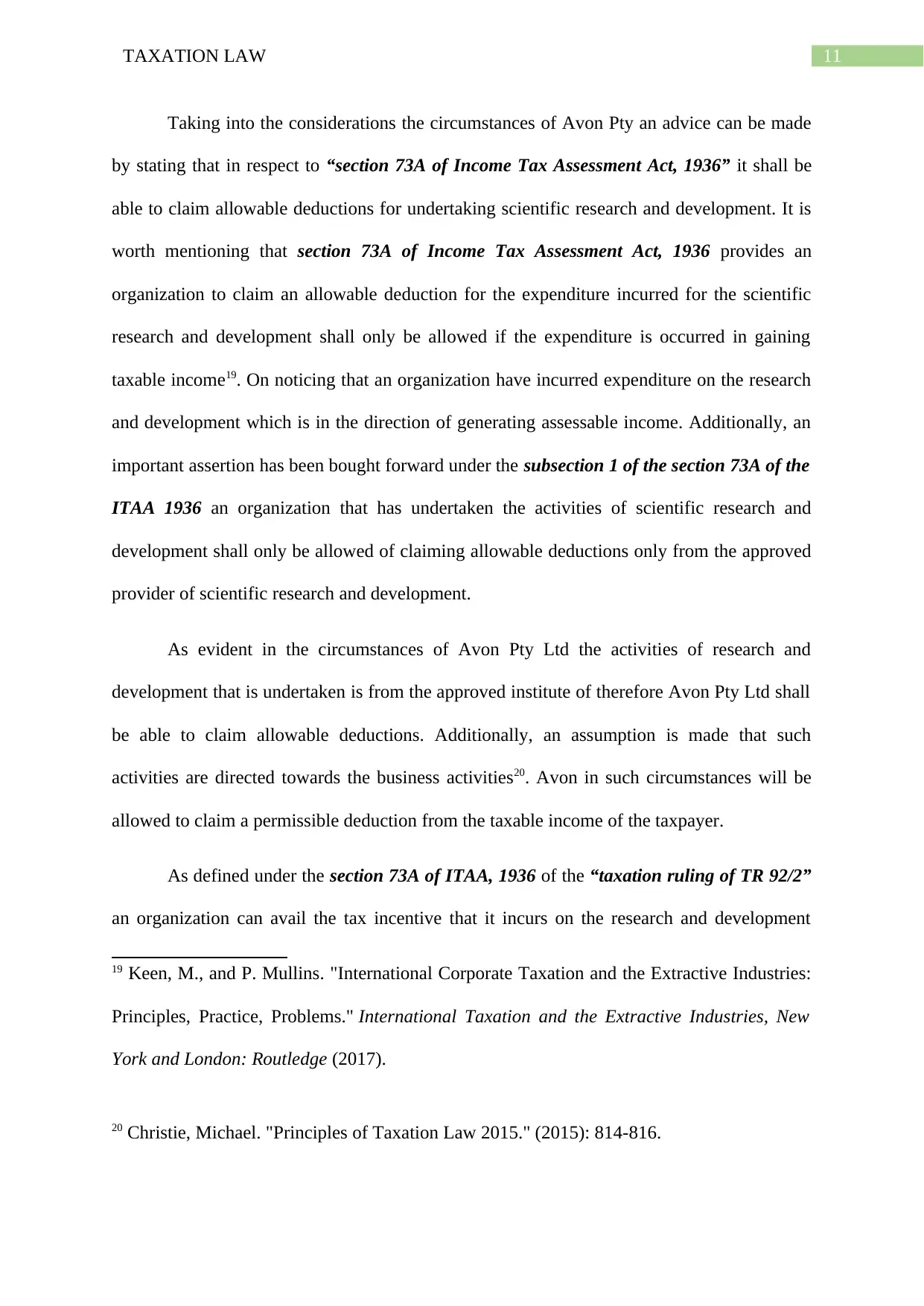
11TAXATION LAW
Taking into the considerations the circumstances of Avon Pty an advice can be made
by stating that in respect to “section 73A of Income Tax Assessment Act, 1936” it shall be
able to claim allowable deductions for undertaking scientific research and development. It is
worth mentioning that section 73A of Income Tax Assessment Act, 1936 provides an
organization to claim an allowable deduction for the expenditure incurred for the scientific
research and development shall only be allowed if the expenditure is occurred in gaining
taxable income19. On noticing that an organization have incurred expenditure on the research
and development which is in the direction of generating assessable income. Additionally, an
important assertion has been bought forward under the subsection 1 of the section 73A of the
ITAA 1936 an organization that has undertaken the activities of scientific research and
development shall only be allowed of claiming allowable deductions only from the approved
provider of scientific research and development.
As evident in the circumstances of Avon Pty Ltd the activities of research and
development that is undertaken is from the approved institute of therefore Avon Pty Ltd shall
be able to claim allowable deductions. Additionally, an assumption is made that such
activities are directed towards the business activities20. Avon in such circumstances will be
allowed to claim a permissible deduction from the taxable income of the taxpayer.
As defined under the section 73A of ITAA, 1936 of the “taxation ruling of TR 92/2”
an organization can avail the tax incentive that it incurs on the research and development
19 Keen, M., and P. Mullins. "International Corporate Taxation and the Extractive Industries:
Principles, Practice, Problems." International Taxation and the Extractive Industries, New
York and London: Routledge (2017).
20 Christie, Michael. "Principles of Taxation Law 2015." (2015): 814-816.
Taking into the considerations the circumstances of Avon Pty an advice can be made
by stating that in respect to “section 73A of Income Tax Assessment Act, 1936” it shall be
able to claim allowable deductions for undertaking scientific research and development. It is
worth mentioning that section 73A of Income Tax Assessment Act, 1936 provides an
organization to claim an allowable deduction for the expenditure incurred for the scientific
research and development shall only be allowed if the expenditure is occurred in gaining
taxable income19. On noticing that an organization have incurred expenditure on the research
and development which is in the direction of generating assessable income. Additionally, an
important assertion has been bought forward under the subsection 1 of the section 73A of the
ITAA 1936 an organization that has undertaken the activities of scientific research and
development shall only be allowed of claiming allowable deductions only from the approved
provider of scientific research and development.
As evident in the circumstances of Avon Pty Ltd the activities of research and
development that is undertaken is from the approved institute of therefore Avon Pty Ltd shall
be able to claim allowable deductions. Additionally, an assumption is made that such
activities are directed towards the business activities20. Avon in such circumstances will be
allowed to claim a permissible deduction from the taxable income of the taxpayer.
As defined under the section 73A of ITAA, 1936 of the “taxation ruling of TR 92/2”
an organization can avail the tax incentive that it incurs on the research and development
19 Keen, M., and P. Mullins. "International Corporate Taxation and the Extractive Industries:
Principles, Practice, Problems." International Taxation and the Extractive Industries, New
York and London: Routledge (2017).
20 Christie, Michael. "Principles of Taxation Law 2015." (2015): 814-816.
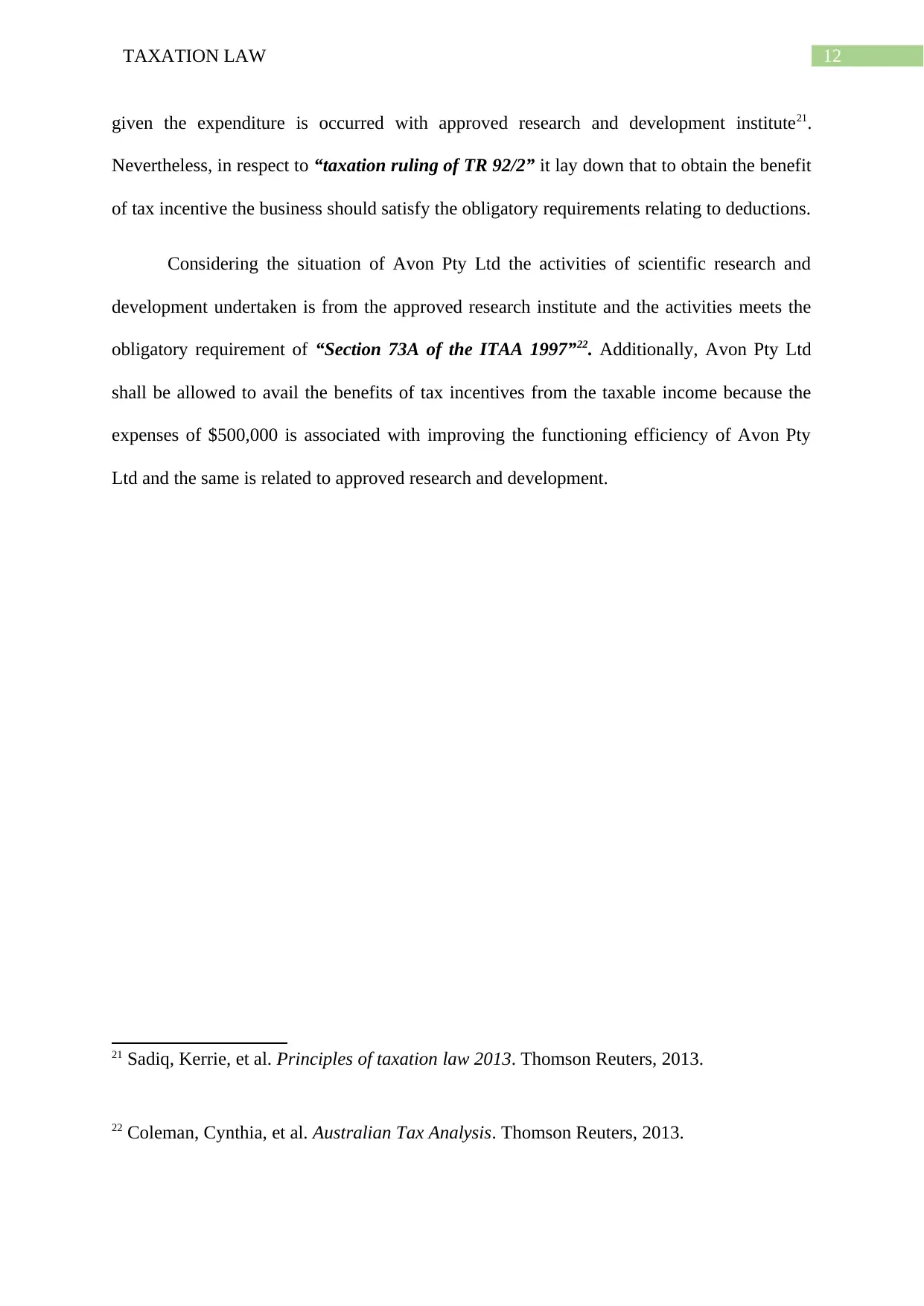
12TAXATION LAW
given the expenditure is occurred with approved research and development institute21.
Nevertheless, in respect to “taxation ruling of TR 92/2” it lay down that to obtain the benefit
of tax incentive the business should satisfy the obligatory requirements relating to deductions.
Considering the situation of Avon Pty Ltd the activities of scientific research and
development undertaken is from the approved research institute and the activities meets the
obligatory requirement of “Section 73A of the ITAA 1997”22. Additionally, Avon Pty Ltd
shall be allowed to avail the benefits of tax incentives from the taxable income because the
expenses of $500,000 is associated with improving the functioning efficiency of Avon Pty
Ltd and the same is related to approved research and development.
21 Sadiq, Kerrie, et al. Principles of taxation law 2013. Thomson Reuters, 2013.
22 Coleman, Cynthia, et al. Australian Tax Analysis. Thomson Reuters, 2013.
given the expenditure is occurred with approved research and development institute21.
Nevertheless, in respect to “taxation ruling of TR 92/2” it lay down that to obtain the benefit
of tax incentive the business should satisfy the obligatory requirements relating to deductions.
Considering the situation of Avon Pty Ltd the activities of scientific research and
development undertaken is from the approved research institute and the activities meets the
obligatory requirement of “Section 73A of the ITAA 1997”22. Additionally, Avon Pty Ltd
shall be allowed to avail the benefits of tax incentives from the taxable income because the
expenses of $500,000 is associated with improving the functioning efficiency of Avon Pty
Ltd and the same is related to approved research and development.
21 Sadiq, Kerrie, et al. Principles of taxation law 2013. Thomson Reuters, 2013.
22 Coleman, Cynthia, et al. Australian Tax Analysis. Thomson Reuters, 2013.
Paraphrase This Document
Need a fresh take? Get an instant paraphrase of this document with our AI Paraphraser
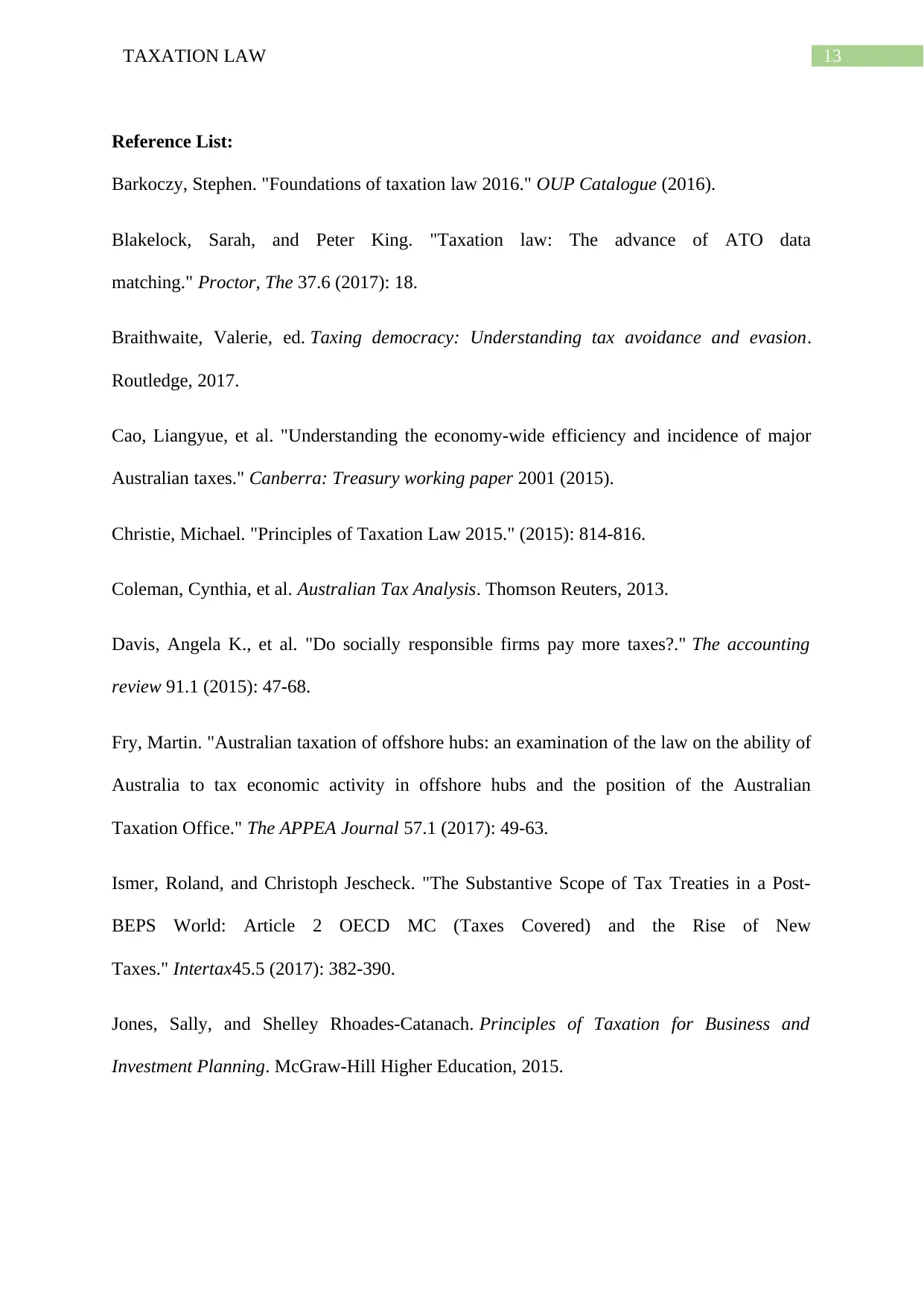
13TAXATION LAW
Reference List:
Barkoczy, Stephen. "Foundations of taxation law 2016." OUP Catalogue (2016).
Blakelock, Sarah, and Peter King. "Taxation law: The advance of ATO data
matching." Proctor, The 37.6 (2017): 18.
Braithwaite, Valerie, ed. Taxing democracy: Understanding tax avoidance and evasion.
Routledge, 2017.
Cao, Liangyue, et al. "Understanding the economy-wide efficiency and incidence of major
Australian taxes." Canberra: Treasury working paper 2001 (2015).
Christie, Michael. "Principles of Taxation Law 2015." (2015): 814-816.
Coleman, Cynthia, et al. Australian Tax Analysis. Thomson Reuters, 2013.
Davis, Angela K., et al. "Do socially responsible firms pay more taxes?." The accounting
review 91.1 (2015): 47-68.
Fry, Martin. "Australian taxation of offshore hubs: an examination of the law on the ability of
Australia to tax economic activity in offshore hubs and the position of the Australian
Taxation Office." The APPEA Journal 57.1 (2017): 49-63.
Ismer, Roland, and Christoph Jescheck. "The Substantive Scope of Tax Treaties in a Post-
BEPS World: Article 2 OECD MC (Taxes Covered) and the Rise of New
Taxes." Intertax45.5 (2017): 382-390.
Jones, Sally, and Shelley Rhoades-Catanach. Principles of Taxation for Business and
Investment Planning. McGraw-Hill Higher Education, 2015.
Reference List:
Barkoczy, Stephen. "Foundations of taxation law 2016." OUP Catalogue (2016).
Blakelock, Sarah, and Peter King. "Taxation law: The advance of ATO data
matching." Proctor, The 37.6 (2017): 18.
Braithwaite, Valerie, ed. Taxing democracy: Understanding tax avoidance and evasion.
Routledge, 2017.
Cao, Liangyue, et al. "Understanding the economy-wide efficiency and incidence of major
Australian taxes." Canberra: Treasury working paper 2001 (2015).
Christie, Michael. "Principles of Taxation Law 2015." (2015): 814-816.
Coleman, Cynthia, et al. Australian Tax Analysis. Thomson Reuters, 2013.
Davis, Angela K., et al. "Do socially responsible firms pay more taxes?." The accounting
review 91.1 (2015): 47-68.
Fry, Martin. "Australian taxation of offshore hubs: an examination of the law on the ability of
Australia to tax economic activity in offshore hubs and the position of the Australian
Taxation Office." The APPEA Journal 57.1 (2017): 49-63.
Ismer, Roland, and Christoph Jescheck. "The Substantive Scope of Tax Treaties in a Post-
BEPS World: Article 2 OECD MC (Taxes Covered) and the Rise of New
Taxes." Intertax45.5 (2017): 382-390.
Jones, Sally, and Shelley Rhoades-Catanach. Principles of Taxation for Business and
Investment Planning. McGraw-Hill Higher Education, 2015.
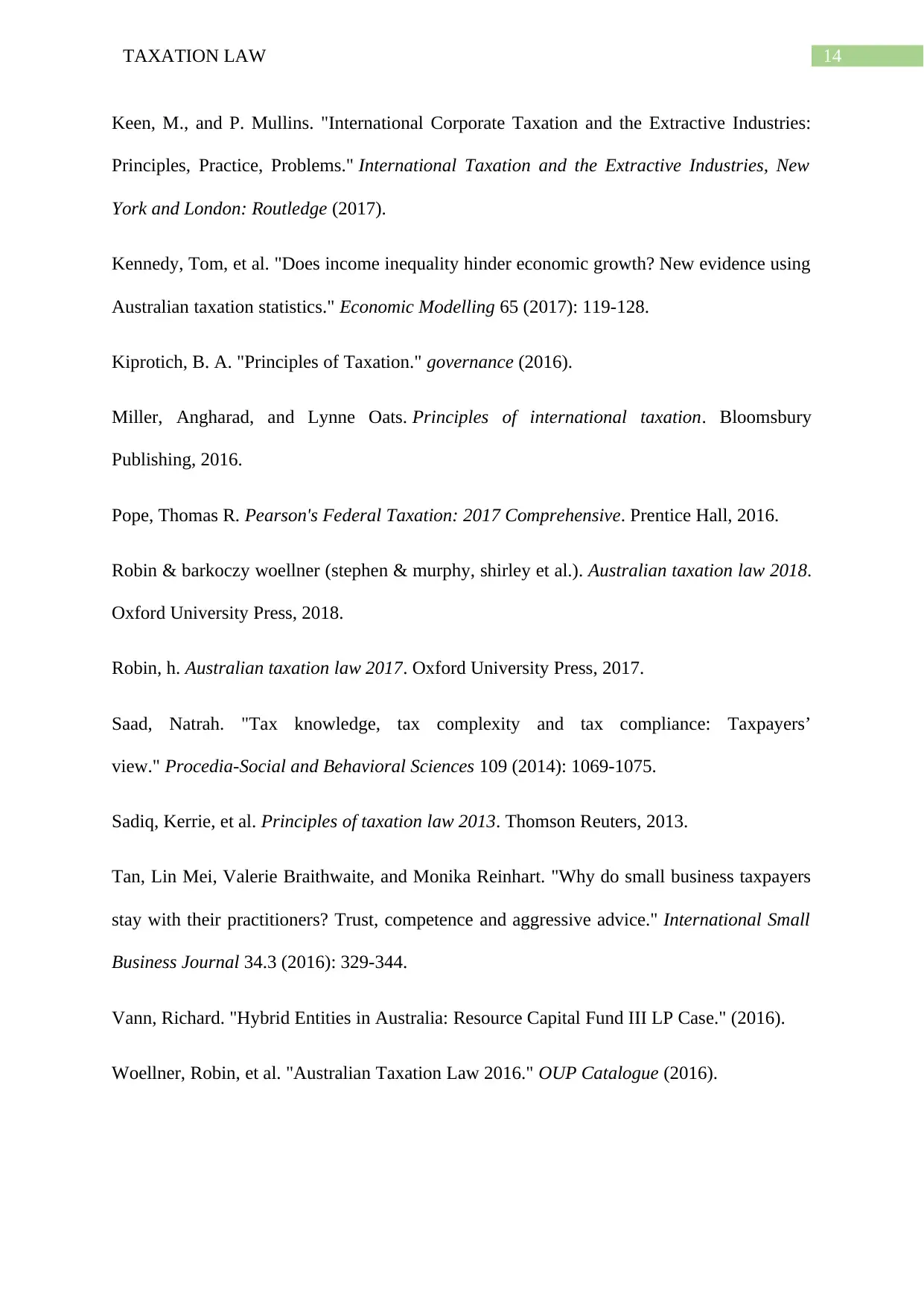
14TAXATION LAW
Keen, M., and P. Mullins. "International Corporate Taxation and the Extractive Industries:
Principles, Practice, Problems." International Taxation and the Extractive Industries, New
York and London: Routledge (2017).
Kennedy, Tom, et al. "Does income inequality hinder economic growth? New evidence using
Australian taxation statistics." Economic Modelling 65 (2017): 119-128.
Kiprotich, B. A. "Principles of Taxation." governance (2016).
Miller, Angharad, and Lynne Oats. Principles of international taxation. Bloomsbury
Publishing, 2016.
Pope, Thomas R. Pearson's Federal Taxation: 2017 Comprehensive. Prentice Hall, 2016.
Robin & barkoczy woellner (stephen & murphy, shirley et al.). Australian taxation law 2018.
Oxford University Press, 2018.
Robin, h. Australian taxation law 2017. Oxford University Press, 2017.
Saad, Natrah. "Tax knowledge, tax complexity and tax compliance: Taxpayers’
view." Procedia-Social and Behavioral Sciences 109 (2014): 1069-1075.
Sadiq, Kerrie, et al. Principles of taxation law 2013. Thomson Reuters, 2013.
Tan, Lin Mei, Valerie Braithwaite, and Monika Reinhart. "Why do small business taxpayers
stay with their practitioners? Trust, competence and aggressive advice." International Small
Business Journal 34.3 (2016): 329-344.
Vann, Richard. "Hybrid Entities in Australia: Resource Capital Fund III LP Case." (2016).
Woellner, Robin, et al. "Australian Taxation Law 2016." OUP Catalogue (2016).
Keen, M., and P. Mullins. "International Corporate Taxation and the Extractive Industries:
Principles, Practice, Problems." International Taxation and the Extractive Industries, New
York and London: Routledge (2017).
Kennedy, Tom, et al. "Does income inequality hinder economic growth? New evidence using
Australian taxation statistics." Economic Modelling 65 (2017): 119-128.
Kiprotich, B. A. "Principles of Taxation." governance (2016).
Miller, Angharad, and Lynne Oats. Principles of international taxation. Bloomsbury
Publishing, 2016.
Pope, Thomas R. Pearson's Federal Taxation: 2017 Comprehensive. Prentice Hall, 2016.
Robin & barkoczy woellner (stephen & murphy, shirley et al.). Australian taxation law 2018.
Oxford University Press, 2018.
Robin, h. Australian taxation law 2017. Oxford University Press, 2017.
Saad, Natrah. "Tax knowledge, tax complexity and tax compliance: Taxpayers’
view." Procedia-Social and Behavioral Sciences 109 (2014): 1069-1075.
Sadiq, Kerrie, et al. Principles of taxation law 2013. Thomson Reuters, 2013.
Tan, Lin Mei, Valerie Braithwaite, and Monika Reinhart. "Why do small business taxpayers
stay with their practitioners? Trust, competence and aggressive advice." International Small
Business Journal 34.3 (2016): 329-344.
Vann, Richard. "Hybrid Entities in Australia: Resource Capital Fund III LP Case." (2016).
Woellner, Robin, et al. "Australian Taxation Law 2016." OUP Catalogue (2016).

15TAXATION LAW
1 out of 16
Related Documents
Your All-in-One AI-Powered Toolkit for Academic Success.
+13062052269
info@desklib.com
Available 24*7 on WhatsApp / Email
![[object Object]](/_next/static/media/star-bottom.7253800d.svg)
Unlock your academic potential
© 2024 | Zucol Services PVT LTD | All rights reserved.




